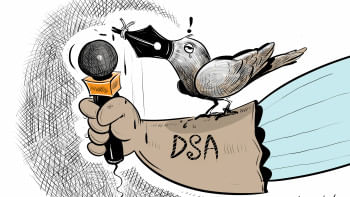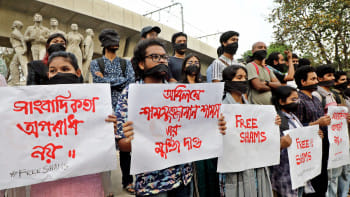This lawfare against the press must stop

We are deeply alarmed by the relentless lawfare (legal warfare) being waged against press freedom and the freedom of speech using various legal instruments. The latest victims of this are a reporter and the editor of Prothom Alo, who have been sued under the Digital Security Act (DSA) for "tarnishing the country's image" using its platforms. The hint, of course, was to the daily's May 26 publication of a report on the astronomical prices of food using a comment from a day labourer, which has since gone viral. The question is, how does the coverage of poor people's struggles constitute a crime? This is nothing but an attempt to intimidate journalists and discredit the message so powerfully captured in said comment.
Reportedly, the general secretary of the ruling party called the report "politically motivated". In all fairness, it is the case filed in this connection that seems politically motivated. The report was done following standard journalistic practices, and Prothom Alo was quick to take appropriate action after an apparent inconsistency was pointed out in its social media post. That should have been the end of it. Anyone with the remotest idea of how the news media works would know that the reporter, Samsuzzaman Shams, was innocent of the "crimes" alleged by pro-AL factions. Yet, he was picked up from his house by officers of the Criminal Investigation Department (CID). His whereabouts were kept hidden for about 20 hours. And two cases were filed against him before he was finally shown arrested in one and produced before a court.
This elaborate charade to harass him reminds us of the legal mumbo jumbo in which another Prothom Alo reporter, Rozina Islam, was implicated not long ago. On Thursday afternoon, drawing a 35-hour-long saga to an end, Shams was sent to jail after being denied bail by the court. On Wednesday, a journalist of Jugantor was sued under the DSA for reporting on a railway syndicate operating in Chattogram. Earlier, the brother of a Bangladeshi journalist of Al Jazeera was allegedly beaten with iron rods for "writing about the PM". In mid-March, journalists covering the election of the Supreme Court Bar Association were assaulted by police. The frequency with which journalists are coming under attack, legally or physically, is really disturbing.
The DSA, for obvious reasons, has emerged as the most preferred tool of repression of journalists and critical voices, as a review by the Centre for Governance Studies (CGS) has shown. The judiciary's role in this regard has also been wanting. We expect the judiciary to stand in favour of journalists especially when they are harassed with trumped-up charges. Unfortunately, just like DSA, the entire legal infrastructure is being instrumentalised today to "chill critical reporting", undermine press freedom, and encourage a culture of self-censorship. This is no doubt an affront to everything that we stand for as a nation. The question is, how long will the authorities ignore calls to create an environment in which the press can function without any fear of consequences?
Shams doesn't deserve to be in jail. The Prothom Alo editor, Matiur Rahman, doesn't deserve to have a DSA case filed against him. All such cases do not deserve to be entertained. We hope that the judiciary will stand with the press and take appropriate steps in this regard soon.


 For all latest news, follow The Daily Star's Google News channel.
For all latest news, follow The Daily Star's Google News channel. 











Comments